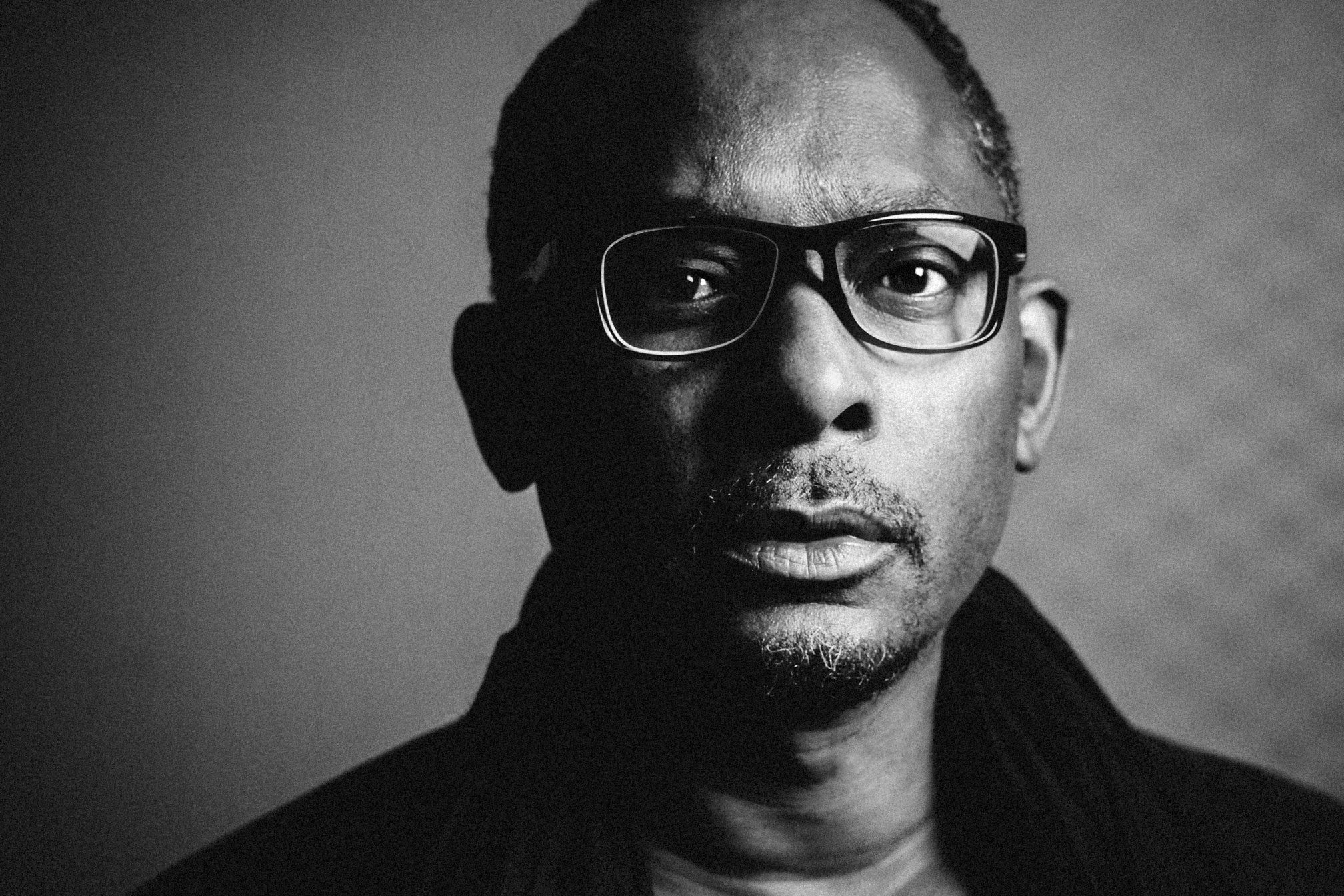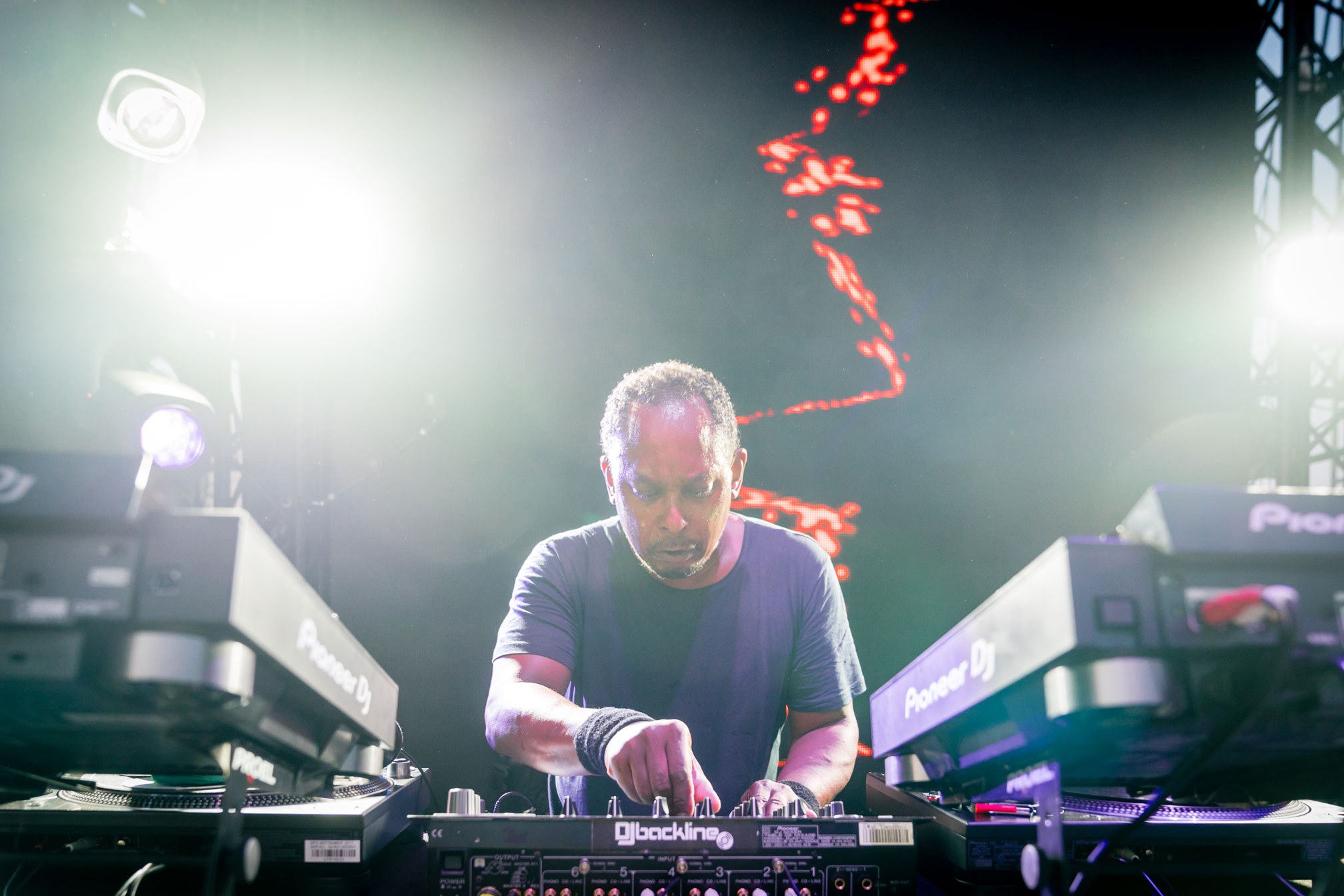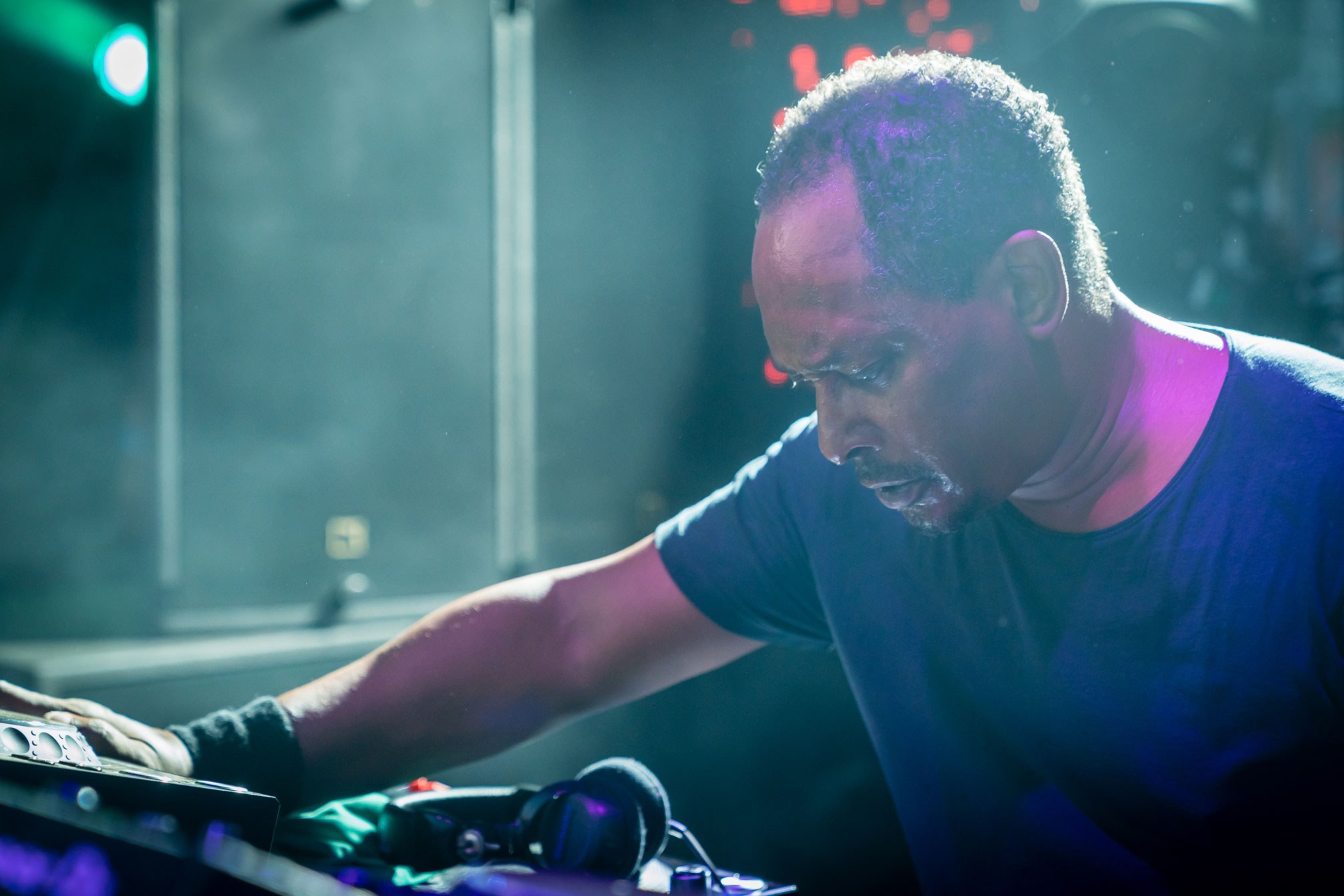 Artists
Artists
Derrick May: "We became the poets of Detroit's struggle"
The techno legend talks Detroit, the state of the scene and his orchestra work
Derrick May needs no introduction.
The techno veteran has had a long and illustrious career since his salad days as part of the Belleville Three. His latest project sees him work with an orchestra, with his next performance of this kind taking place at London's Southbank Centre on August 29.
May will present his collaboration with the City of London Sinfonia orchestra, which is directed by Dzijan Emin. The pair are dedicated to bringing the energy of techno and May's sound to life with an orchestra and the London show is a rare chance to see this taking place.
We spoke to May about putting the show together, breaking down the barriers of 'high culture', festival culture and how hard he's worked to represent techno and the city of Detroit...
How do you think each orchestra puts their own spin on your music? Do you have any favourite arrangements?
You don’t really get a spin or perspective from the orchestras. The twists and the unpredictable moments are going to come from myself or from my director. Other than that, the orchestras have been trained too much to react to what they see, only to what they see, not what they feel. So you don’t get that chance to discuss with the orchestra beforehand: “Hey, if this is really moving just go ahead and keep it going, just tear it up, let’s just do it!” They don’t really do that. I wish they did but they don’t.
What’s the creative process behind these performances and how involved are you in it?
First of all Dzijan Emin being my director, he works effortlessly to try to keep the show within 90 minutes and to try to pick the best songs for the show. He is transcribing music, so he’s not just a director, and he’s a hell of a musician. And my involvement is working with him, not in transcribing but in which songs should we use, how the music is presented within that show, what song’s last, middle songs y’know. That’s that part of it. And like I said before the orchestra, they just don’t really do anything that you don’t expect. And they will not play over 90 minutes, most people are not aware of that. That’s the law in the orchestra business. 90 minutes. If they go any longer than that, it’s virtually impossible. They just will not do it.
Some people would never think to perform techno tracks with an orchestra, what about an orchestra attracted you to it?
This goes back a long time. This goes back to when I first started making music. Back to my very first days. Everything I make, every song I created, I always felt an orchestra in it. I make what I like to call ‘scenery music’. It’s scenery music with a touch of victorious ambition within it. I was an athlete in high school, in university. And my music has always been about my childhood, the dreamlike happiness that I put in the strings and the melodies. And then there’s the sense of trying to get somewhere or be somewhere or fight hard. And these are things I’ve fortunately been able to integrate into the music directly from my personal life. And I’ve been able to do it well. And when I was making music back then, every song I made was always thought of as a song that could be played in an orchestra or it could be used in a television dramatic scene or in a film. I’ve been thinking of this for the past 30 years.

Orchestral and techno music are kind of two sides of the same coin in that they’re often misunderstood and have difficulty breaking into the mainstream, do you think that’s why the go so well together?
Well, I don’t know. The orchestra, even from 400 years ago, it’s always been more of a very highfalutin kind of clientele. An educated, more sophisticated clientele, supposedly. So I don’t know if it was ever meant to be accepted on any other level than it has been. I think that it’s always encircled itself with a very precise community that was only interested in enjoying it as it once was, and it would always stay the same and they knew it and they became a part of that society because they enjoyed that part of it.
I think that now a lot of those people are the last of those people, they’re in their late 70s or middle 80s, and they don’t come out anymore. They’re not there to support the orchestras anymore and this is one reason why the orchestras reached out to electronic music artists. Even if we had the ambition that we wanted to do it, it was always a dream, we didn’t necessarily have the vehicle or the opportunity or the invitation to do it until that generation that was part of keeping it exclusive got old. And then the orchestras had to open their doors, they have to reach out to the younger generation because they’re starving. They’re actually starving and they’re doing everything they can to stay alive.
So the symphony never wanted to be popular, and I don’t think it wants to be popular now. But I think it has no choice but to reach out to a medium that it normally never would, creating much more popularity for themselves than they once had. But the difference is, I think they still have integrity. They still want to get the quality stuff that represents the artist, a body of material, not just one song but an actual artist, and they want to stand behind them.
Other DJs have also performed their music with orchestras, how do you think this will change the scene? Is there a bright future for more genre-bending performances like this?
You know what, Jeff Mills deserves all that credit. Jeff and I have known each other since we’ve been about 17 years old. He’s from Detroit as well and we were always in some form or another contemporaries, as far as playing music on the radio, having our different shows, giving parties, being part of this very powerful movement when we were really young. And we never really thought about it, we were doing it. It became second nature and it was just something that we kept doing until it became what it is today. But it was Jeff, and he deserves all the credit, that he did this first. And now he’s not the very first, it was artists well before we were even making music that were electronic music artists that were doing this. But in the last 20 years it’s been Jeff that has done it and done it well. And he inspired me. It was actually kind of a competition because I’d always wanted to do it with my music and I felt “Damn, Jeff beat me to it!”
My point is that I think a lot of these people are doing it because we’re doing it, because Jeff did it, and I don’t think that they really made their music with the intent and to be involved with this. I think some of them are doing it for that same opportunity that we talked about, how it’s just like they need to stay relevant. That’s what concerns me, is that it cheapens the effort and all the work that goes into this, and the beauty of it. And I don’t want to see that happen, but it seems to be the case with opportunists always jumping on the fucking wagon. I want to believe that the right people get the chance to do this with their music so the world can hear it properly before it’s over.

Recently Jeff Mills spoke about how dance music used to be inherently political but that it’s since changed and become too middle class, do you have any thoughts on that?
Well like I said, we come from middle class families. We’re not poor kids. The Detroit music scene was never a poor, abject scene. Juan’s family was wealthy, Kevin’s family was fairly wealthy. I come from a single home, I have no brothers or sisters, my mother raised me alone but she worked for a motor company, she was a secretary. I went to some of the best schools, lived in some of the best neighborhoods, played with some of the nicest kids in the city, learned from some of the roughest kids in the city. Without living in a poor neighborhood, I didn’t grow up poor. None of us did. And there’s that impression that because we’re black and we come from Detroit that we’re poor dumbass black kids or whatever. We’re not, we never were. We always had a perspective about this music, where we wanted it to go. We had a vision. We believed in author Alvin Toffler and other people like that, we listened to all this other electronic music that gave us this insight, we were well into intellectual sci-fi movies and books. We have never been these dumbass black kids from nowhere that made this music, like this idea fell out of the fucking sky. And every time journalists would come and see us back in the day they would always say the one question to us that was condescending and insulting: ‘So how did you make this music? How did you do this?’ What do you mean how did we do this? And it was always the same, and then it turned out to be a positive thing in the end because journalists were always impressed and amazed and we always spoke so well, and they realized very quickly that we’re not stupid and we didn’t come from abject poverty. We lived around poverty, we lived in Detroit. We lived around strife, sadness, struggle. We lived around anger and madness and resentment. But we absorbed it in a very prophetic way, in a very sympathetic, empathizing manner where it became our backdrop to the story of the likes of us and the city of Detroit. We became the poets and the speakers and the writers of our city and our city’s struggle.
So when Jeff said whatever he said about the middle class, I think he meant it more that the perspective of the music, the understanding of where it comes from has been lost within the people that support it now, the people that are supposedly the new audience. The working class mentality has been left out of the music. The struggle that is gone from the music because the people making it never struggled for anything. See, remember this: we had to struggle from the very beginning because we were making this music and nobody paid attention to us. You have to understand when we made our first records nobody believed in us. Nobody. There was no international DJ, it didn’t exist. There were no music magazines writing about Detroit music. There was no love and respect for what we were doing because nobody believed we could do it. When we did this, we did it against the whole fucking world! And it’s very difficult for people to understand that, or just see that. But you have to understand, it was two of us, then it was three of us, then it was six of us. And that was against the whole fucking world!
How do you think the techno scene will evolve in the future?
There’s no barometer anymore. Anything and anybody can be considered talented because 90 per cent of everybody in this business is not talented. It’s not their fault, it’s not an insult if people say that. I’m not being a negative or pessimistic person here, I’m just telling it like it is. The creative process has been lifted — there are still some very creative people in it doing some wonderful things, but the people that are jumping to the front of the line right now, they’re part of a bigger machine. They’re part of a process to create scenery, and when I say scenery I mean these festivals for instance that I always warned against years ago. I warned people that the festivals would one day destroy the club scenes in cities. There’s a television interview that I did years ago, I was in Amsterdam at a festival in the back of a car, and I’m talking about this exact thing. And I’m telling people that if these festivals continue at this rate they are going to destroy the club scene and the impact of doing that is that we will lose our local, young, developmental stage of real creativity, of artistry. The young kid that is the young DJ that warms up for the audience. All the young creatives coming together to dance and laugh and make love and get to know each other and go get something to eat together after the party. And it was hooking up at the local café a couple days later, and then getting to know each other on that level and taking it into the studio. Or sitting back together, collaborating on ideas for plays or books or maybe they want to do their own parties. We’re going to lose that because there won’t be a mentality or a belief that they can accomplish anything knowing that they have to deal with the Tomorrowlands and shit like that. They can’t compete with that, how can they? The people who are doing these events are not from music. They’re college graduates with MBAs and they have logistical ideas and financial ambitions and they don’t care about dance music. They’re gauging their line-ups based on how many numbers a person has on their account, how many likes, dislikes or whatever. So it’s very different. And PR companies are developing these less than qualified people from all parts of the world, man and woman alike, to represent this music and then they’re attempting to make them look like they’re the greatest in the world by getting collaborations from whatever media that its left, and putting them in spots on festivals. It’s a business on top of another business with an agenda to make a lot of fucking money.
Who are some DJs and producers that you think are leading the way for techno music and DJing?
There’s a couple of Detroit artists that are definitely focused on trying to hold up the flag and keep it running. One of them is in between electro and dance music. He calls himself Drummer B. I talk about him because he’s so talented and he’s patient and he’s got a skill level that can only come from being in a city like Detroit. Being surrounded by legacy, being surrounded by so much talent, believing in his own thing. He’s got elements of Detroit sound but he’s also got his own sound. He’s not laying down or relying just on the Detroit thing. He could flip on you and do something interesting with dance music and he could turn on and do straight up electro. I said this about Carl [Craig] 25 years ago: his boundaries are limitless, this guy could go to the moon with what he’s doing. He’s got so much talent. He’s only just begun but it’s almost impossible for him to get off the ground now because the industry has changed. There’s not that opportunity that there once was where people were just talented that they immediately are appreciated and discovered.
Now that you’ve done this project, do you have any new ideas and concepts that could take your live shows even further?
I still want to get into the film industry, I still want to have the chance to expose this music to as many people as possible. I still want to be a representative for the music and I still want to be motivated and inspired. So yes, I have many aspirations to create more projects, definitely. And to see the people I work with have the opportunity to have their music heard. And if that’s through more orchestras, or being involved with film and television, or the cinema. I’d love very much as well to work with off-Broadway productions or even off-off-broadway. I’d definitely want to do it. I’m looking forward to meeting Brian Eno, that’s a meeting that’s coming up soon for me.
Derrick May and The Orchestra performs at the Southbank Centre on August 29. Get tickets here



